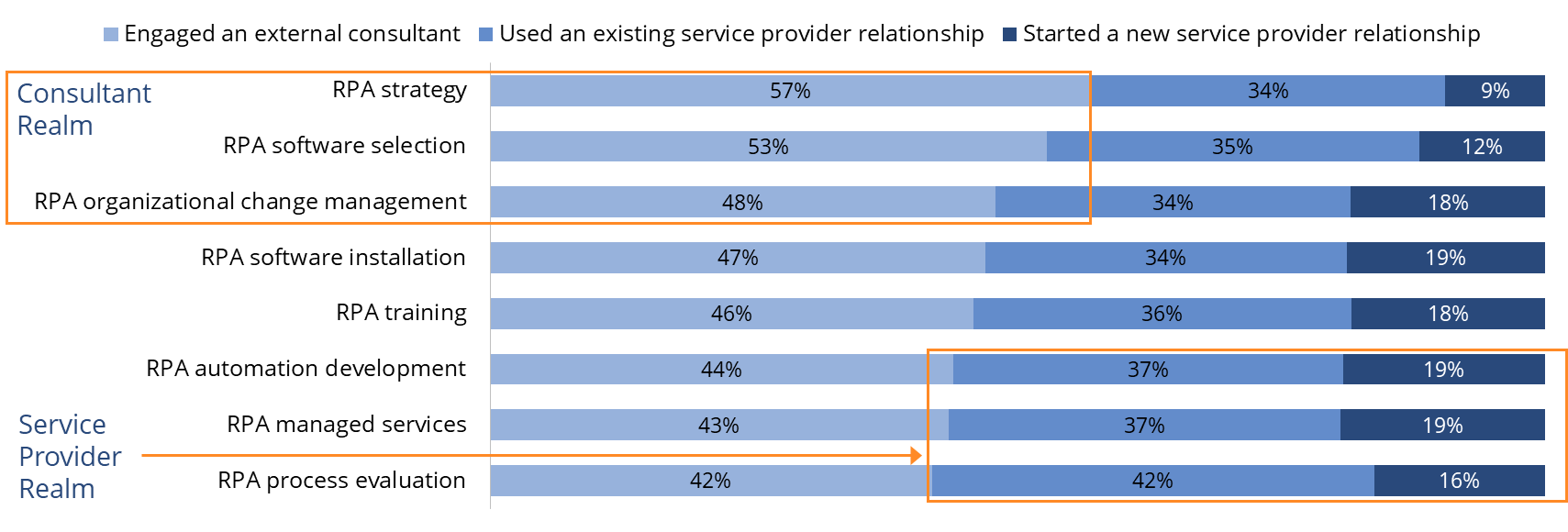ISG Research conducted a survey of 549 European business leaders to assess their adoption of robotic process automation (RPA) technology and services. Here we explore the finding that indicates frequent third-party involvement in the RPA ecosystem for enterprises in Europe. Previous Research reports and posts covered other notable findings.
The RPA hype today is a heady cocktail of new offerings, niche providers and artificial intelligence (AI). Amidst all this momentum, we must assess how close the hype is to reality. Is there a critical mass of stories in which RPA is truly benefiting an organization?
Enterprises that rush to install armies of bots across all types of processes typically burn their fingers, leading to many initial RPA project failures. Despite known challenges in getting started, ISG’s recent RPA survey that looks at enterprise adoption in Europe indicates no respite to the automation momentum. Notwithstanding stories of center of excellence (CoE) failures, aborted implementations and the inability to scale, survey results show an increasing interest among organizations to invest in RPA. Results of our survey also show that budgets are expected to increase an average of nine percent year-on-year until 2020. So, is there an underlying contradiction here?
We don’t think so. Call it a resurrection if you’d like, but despite failures in RPA projects, organizations are looking at doing it this time around with renewed vigour – and doing it right. What does “doing it right” look like? It looks like building a foundation of automation on a well-defined strategy, communication plans and organizational change management (OCM).
A key finding from our RPA survey reinforces the importance of having a sound strategy that includes plans to scale and increase the benefits of RPA (Figure 1). About half of the European companies surveyed are engaging with external consultants for help with RPA decision-making (labeled as “Consultant Realm” in Figure 1). These consultants provide talent, governance and guidance on creating the appropriate organizational model to integrate and scale automation.
Figure 1: RPA Ecosystem: What Role Do Third Parties Play?

Source: ISG Research 2018 Q1 EMEA RPA Study, n = 549. Remaining percentages – not selected.
Our survey indicates that service providers have more involvement than external consultants in RPA development and managed services. Nearly 60 percent of European companies surveyed prefer to engage third-party service providers to implement automation-led solutions and help develop effective architectures to accelerate the automation journey. The survey also bodes well for incumbent providers – it indicates that existing relationships are favored by European companies, which are almost twice as likely to engage with an incumbent than they are to engage with a new provider.
Lastly, the data show preference to external consultants over service providers for the early activities of strategy, tool selection and OCM. We think that’s because the market views service providers as the delivery engine that may not possess the skills necessary for looking at the larger picture. External consultants can help make strategy decisions such as conducting initial proofs of concept, implementing standards and supporting organizations in the change and business-readiness elements of RPA initiatives.
Service providers need to look at and invest in RPA as a way to help clients unlock significant benefits. Doing so will ensure that RPA drives value for both parties involved. Both automation consultants and service providers should:
- Focus on expanding into end-to-end consulting-led engagements. Service providers should invest in capabilities to define a target operating model based on a clear understanding of the overall strategy of the business. The model should define how an enterprise can integrate RPA optimally across its value chain.
- Focus on an implementation roadmap based on process assessment and rationalization using experience from previous engagements to improve the plans.
- Work on creating a robust and sustainable governance mechanism that matches the goals and culture of the enterprise.
Associated Insights
ISG Automation Summit: Are You Bot 3.0 Ready?
Is IT a Catalyst or Adversary to your RPA Initiative?
RPA in Europe: Enterprise Plans, Budgets and Organizational Impact
